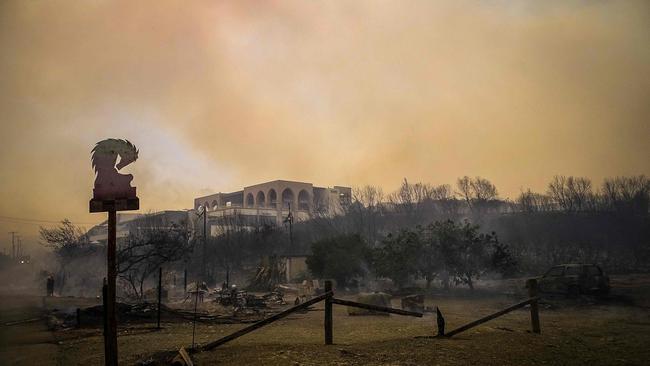Thousands flee bushfires in Greece as Earth bakes
About 30,000 people were evacuated from fires on the Greek island of Rhodes, while almost a quarter of the US population struggled under a record-breaking heatwave.

About 30,000 people were evacuated on the Greek island of Rhodes where a bushfire burned at the weekend, and almost a quarter of the US population struggled under a record-breaking heatwave.
Tens of millions of people have been suffering through intense heat this summer and the world looks set for its hottest July on record.
On the Mediterranean island of Rhodes, where a fire has been blazing for days, boats carried 2000 people to safety from beaches in the east. Three coastguard ships led more than 30 private boats in the emergency evacuation, while a Greek navy boat was heading to the area.
Elsewhere dozens of buses took people to safety, while others had to walk where fires had cut off road access.
From the moment the evacuation alert sounded early on Saturday afternoon, tourists had headed for the beach, pulling their suitcases behind them.
People were being taken to gyms, schools and hotel conference centres on the island where they stayed overnight. Three passenger ferries have been moored at the port to accommodate those rescued. The battle to extinguish the fire continues in the area of Laermon and Lardos, where it is raging out of control.

High winds and a 9km front running from the centre of the island to its eastern beaches were creating extreme conditions, fire service spokesman Vassilis Varthakogiannis told Skai TV.
“This is not a fire that will be over tomorrow or the day after tomorrow,” Mr Varthakoyannis said. “It’ll be troubling us for days.”
Greece is fighting dozens of forest fires 12 days into a heatwave that has seen temperatures soaring above 40C. It could be the longest hot spell the country has seen.
The exceptional temperatures also meant key tourist sites such as the Acropolis in Athens closed during the hottest part of the day.
Emergency health officials told the state broadcaster they had admitted at least 38 heatstroke patients in the three days up to Saturday, while hospitals were also seeing cases of fainting and other heat-related conditions.
Across the southern US, about 80 million Americans are sweltering in temperatures of 41C and above.
The country’s worst heat of up to 46C was forecast for Phoenix, Arizona, which has recorded three weeks in a row of highs above 43C.
Tourists have flocked to Death Valley, which straddles the border between California and Nevada, to post selfies with a temperature display outside the visitor centre. Many hope to see it break a world record of 56.7C, which was set in July 1913.
Further north, in Canada, which has been suffering fires that left Montreal blanketed in smog, torrential rain hit the eastern province of Nova Scotia, cutting off roads and threatening to burst a dam.
Four people were reported missing, including two children who had been in a car engulfed by flood waters.
July is on track to be the hottest month, not only since records began, but also in “hundreds, if not thousands, of years”, said leading NASA climatologist Gavin Schmidt.
The effects cannot be attributed solely to the El Nino weather pattern, which “has really only just emerged” and isn’t expected to strengthen until later in the year, he said.
El Nino is associated with the warming of ocean surface temperatures in the central and eastern Pacific Ocean.
AFP



To join the conversation, please log in. Don't have an account? Register
Join the conversation, you are commenting as Logout